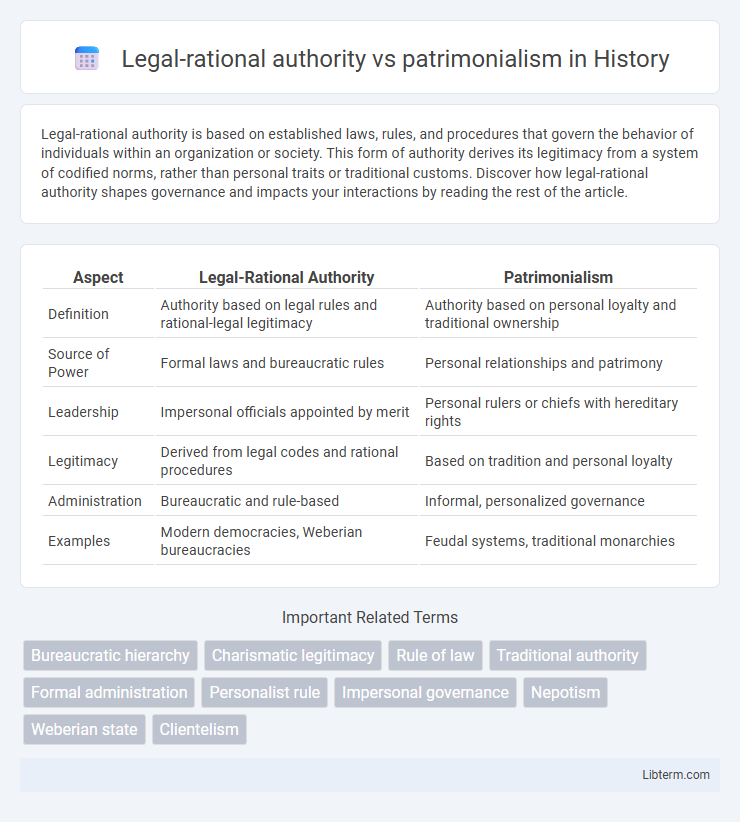Legal-rational authority is based on established laws, rules, and procedures that govern the behavior of individuals within an organization or society. This form of authority derives its legitimacy from a system of codified norms, rather than personal traits or traditional customs. Discover how legal-rational authority shapes governance and impacts your interactions by reading the rest of the article.
Table of Comparison
| Aspect | Legal-Rational Authority | Patrimonialism |
|---|---|---|
| Definition | Authority based on legal rules and rational-legal legitimacy | Authority based on personal loyalty and traditional ownership |
| Source of Power | Formal laws and bureaucratic rules | Personal relationships and patrimony |
| Leadership | Impersonal officials appointed by merit | Personal rulers or chiefs with hereditary rights |
| Legitimacy | Derived from legal codes and rational procedures | Based on tradition and personal loyalty |
| Administration | Bureaucratic and rule-based | Informal, personalized governance |
| Examples | Modern democracies, Weberian bureaucracies | Feudal systems, traditional monarchies |
Defining Legal-Rational Authority
Legal-rational authority is defined by a system of rules and laws that are formally enacted and consistently applied, ensuring legitimacy through established procedures rather than personal loyalty. It contrasts with patrimonialism, where power is based on personal relationships and traditional customs, often blending public and private interests. Max Weber identified legal-rational authority as a characteristic of modern bureaucratic states, emphasizing impersonal and codified governance.
Understanding Patrimonialism
Patrimonialism is a form of governance where authority is based on personal loyalty and the ruler's control over resources, rather than established legal norms or bureaucratic regulations. Unlike legal-rational authority, which relies on codified laws, formal rules, and impersonal relationships, patrimonialism intertwines public and private interests, leading to the ruler's personal discretion in decision-making. This system often results in nepotism and patrimonial administration, where governance mirrors familial or tribal structures rather than modern state institutions.
Historical Roots of Both Models
Legal-rational authority emerged from Enlightenment thought emphasizing codified laws and bureaucratic governance, rooted in the works of Max Weber and the development of modern state institutions in 19th-century Europe. Patrimonialism, by contrast, traces its origins to traditional monarchies and feudal systems where authority is based on personal loyalty, inheritance, and the ruler's household control, prevalent in pre-modern societies across Asia, Africa, and Europe. The historical distinction lies in legal-rational authority's basis on impersonal rules versus patrimonialism's foundation in personal, familial, and patrimonial relationships.
Core Characteristics Compared
Legal-rational authority is defined by a system of rules and laws that govern leadership, emphasizing impersonal and formalized bureaucratic structures where authority is derived from legal legitimacy. Patrimonialism, in contrast, is characterized by personalistic rule where authority is based on traditional loyalty and the ruler's personal discretion, often merging public and private interests. Core differences include rational-legal authority's reliance on codified regulations and merit-based appointments versus patrimonialism's dependence on kinship ties, patrimonial favor, and arbitrary power distribution.
Leadership Structures and Succession
Legal-rational authority features leadership structures based on formal rules and regulations where succession occurs through established legal procedures, such as elections or appointments. In patrimonialism, leadership is personalized and hierarchical, with authority derived from loyalty and tradition, and succession typically follows hereditary or familial lines. This contrast highlights the institutionalized, impersonal nature of legal-rational authority compared to the personalized, kin-based leadership in patrimonial systems.
Impact on Governance and Administration
Legal-rational authority ensures governance through established laws and formal rules, promoting predictability, accountability, and bureaucratic efficiency in administration. Patrimonialism relies on personal loyalty and traditional authority, often resulting in arbitrary decision-making, lack of institutional checks, and blurred boundaries between public and private interests. The contrast impacts administration by shaping the degree of professionalization, corruption control, and consistency in policy implementation.
Bureaucracy in Legal-Rational Systems
Legal-rational authority is characterized by a structured bureaucracy where officials operate based on formal rules, regulations, and meritocratic principles, ensuring impartiality and efficiency. In contrast, patrimonialism centers on personal loyalties and traditional authority, with power exercised through personal relationships rather than codified laws. Bureaucratic organization within legal-rational systems promotes rational decision-making and accountability, minimizing arbitrary rule inherent in patrimonial systems.
Patrimonialism and Personal Rule
Patrimonialism is a form of governance where authority is based on personal loyalty and the ruler's private ownership of power, rather than institutionalized laws or bureaucratic norms. Personal rule often involves the concentration of power in the hands of a single leader who exercises authority through patronage networks and informal relationships. This contrasts with legal-rational authority, which derives legitimacy from codified rules and a bureaucratic framework ensuring impersonal and predictable governance.
Case Studies and Real-World Examples
Legal-rational authority is exemplified by modern bureaucratic states such as Germany and the United States, where governance is based on codified laws, formal rules, and institutionalized procedures ensuring predictability and accountability. Patrimonialism is illustrated by pre-colonial African kingdoms and traditional monarchies like Tsarist Russia, where authority was personalized, with power centralized in a single ruler or elite, often maintained through patron-client relationships rather than formal legal structures. Case studies of Weber's analysis reveal that while legal-rational systems promote efficient administration and democratic governance, patrimonial systems often face challenges related to nepotism and corruption, impacting state stability and development.
Implications for Modern Politics
Legal-rational authority, characterized by rules, laws, and bureaucratic governance structures, fosters predictable and impersonal political systems essential for modern democratic states. Patrimonialism, based on personal loyalty and familial ties, often leads to nepotism and autocratic rule, undermining institutional legitimacy and policy consistency. Modern politics increasingly favors legal-rational frameworks to promote transparency, accountability, and rule of law, while patrimonialism poses challenges to democratic consolidation and governance efficiency.
Legal-rational authority Infographic

 libterm.com
libterm.com